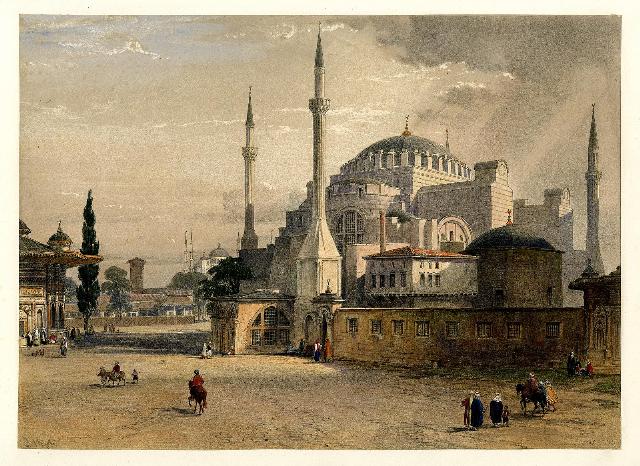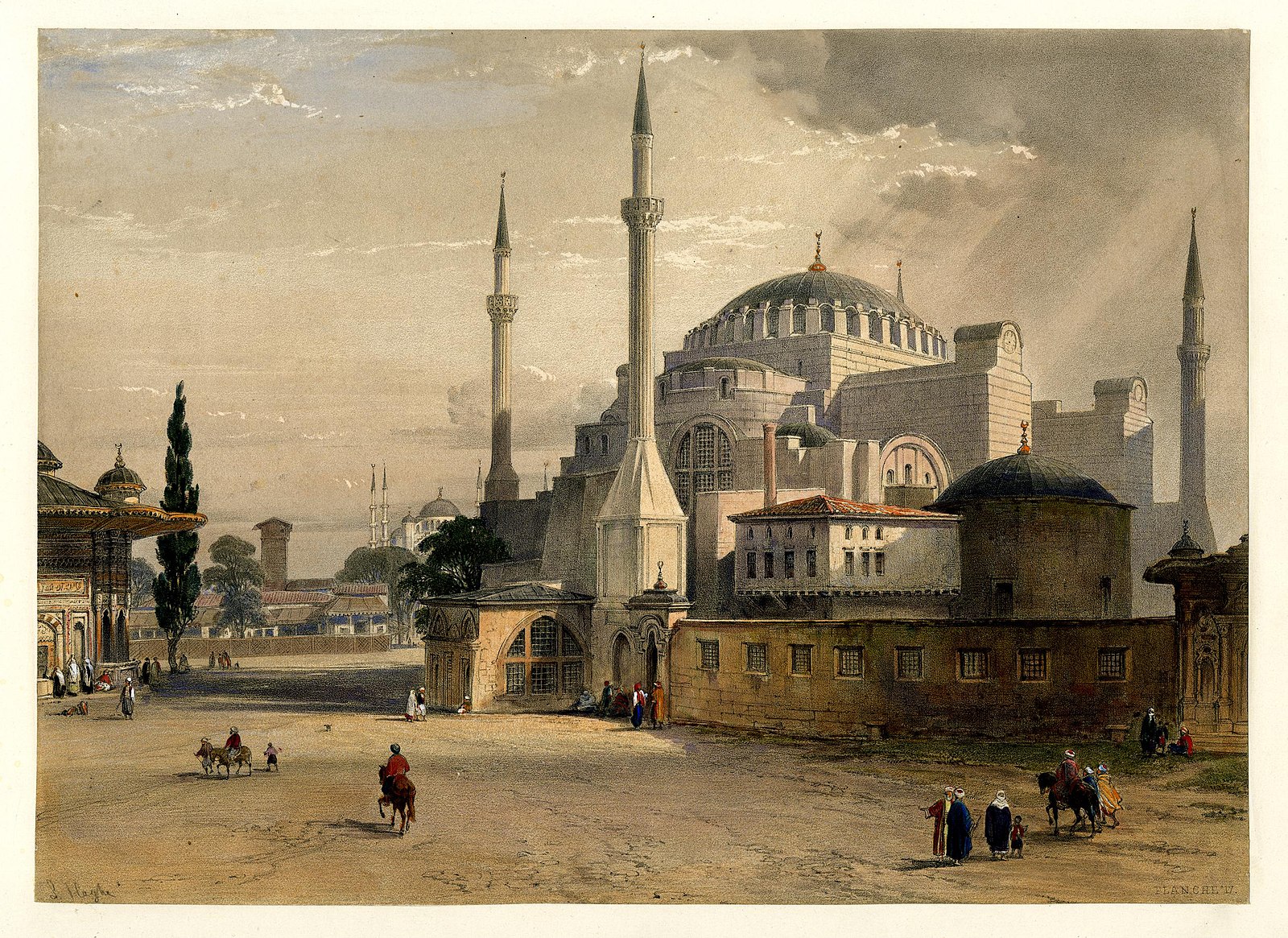

Photo Credit:British Museum, Public domain, via Wikimedia Commons
British Museum, Public domain, via Wikimedia Commons
Christendom sows the seeds of its own destruction by warring with itself and tempting the enemy.How rich and wonderful Christendom could have been. A miracle of aesthetic sublimity and principled ethics. As a matter of fact, a world much like this did once exist: A world in bloom.
Around the time, when Theodosius I issued the Edict of Thessalonica (380 C.E.), the Roman Empire bordered Caledonia in the North and integrated African provinces in the South, encircling the entire Mediterranean Sea. After his death, the empire was divided into two halves, each with its own capital: Rome in the West — the center of urban sophistication — and Constantinople in the East — a rising giant favored by its geography, the gateway to the Orient. A string of beautiful, historic cities wound its way through Anatolia and the Levant. And beyond: Jerusalem itself. Christian lands resounding with church bells and hymns. The gospel of love and forgiveness. Civilization in its youth.
Somewhat in the style of the Greek city-states, known to be divided and haughtily neglectful in calls for unity against the common enemy from the East (i.e. the Achaemenid Empire), the Christian principalities of the Middle Ages vied for regional supremacy and squandered their resources on petty intrigues and skirmishes. A reflection of the chaotic power struggles going on in the absence of Pax Romana, their rulers, albeit first-rate duelists or drinkers, as the case may be, were hedonistic, capricious, and driven by anything but noble motives. Occasionally, however, they joined forces and took part in crusades to liberate the Holy Land.
Ultimately, the avarice and imprudence of Westerners helped bring about the downfall of the Eastern Roman Empire. Towards the end of the Fourth Crusade, Franks and Venetians, in defiance of the actual task assigned by Pope Innocent III, committed an unforgivable betrayal: They turned against their fellow believers and sacked Constantinople (1204 C.E.). The tragic events, including the territorial partition of the empire, meant to accommodate the desires of individual knights, led to economic disaster and set in motion institutional decline. As if to add insult to injury, the city was heavily struck by the plague (1347 C.E.). The image of decay, as time passed, the inhabitants could barely populate the insular quarters separated by meadows and thickets.
Nevertheless, the rumors that the Ottomans had stormed the Theodosian Walls (1453 C.E.), until then perceived as indestructible, shook the whole of Christendom to its foundations. No sooner had they broken through the defenses than they unleashed hell: They pillaged the markets and palaces of Constantinople, massacred or enslaved the inhabitants, and desecrated the ancient cathedral of Hagia Sophia. The horrors remain a trauma without equal in the history of Christendom.
In the following centuries, princes and bishops may have secretly toyed with the idea of recapturing Constantinople. As recently as in the aftermath of the Great War, there would appear to have been a slim chance of putting things right and restoring the old order. In accordance with the Armistice of Mudros, British, French, Greek, and Italian forces occupied the city and stayed there for five years (1918-1923 C.E.). The majority of inhabitants in those days were actually non-Muslim: Greek Orthodox, Armenian Apostolic, and Jewish. When it came down to it, however, the Western powers hesitated and held back. The resolve to make amends for the historical betrayal against fellow believers in the East failed them at the crucial moment. Meanwhile, the last Christians have been expelled from the city.
So, regardless of their military advantage, Christians ultimately gave up on becoming masters of Constantinople again. Arguably, the fratricidal war in Europe hurt their self-understanding and impaired their judgment.
Though rightful heirs to a civilization dating back to the Greek city-states, Western powers became embroiled in an apocalyptic war based on idiotic entanglements in princely families. Unlike the war that followed, the Great War was not about ideological antagonisms. Its unspeakable sacrifices were of no avail. However, it weakened the West in a way reminiscent of the long-term damage suffered by the Eastern Roman Empire in its day: At the hands of Western Crusaders, who committed an unforgivable fratricide like from the Old Testament, it was broken and never recovered. Apparently, the city survived; in reality, it was doomed.
When the Ottomans laid siege to Constantinople and set about the bombardment of its walls with a delay of 250 years, it gave way before long. Now, does the same apply to the West? Should we consider ourselves morally disabled and vulnerable 100 years after the Great War, somehow predestined to surrender and be erased from history? Might the fall of the West, in fact, represent a higher justice: The eventual punishment for the betrayal of Constantinople by the Crusaders?
Westerners lost heart in the killing fields of Flanders. This fateful, if not fatalistic, notion provides an explanatory framework in the main. The tragedy of the Great War, with myriads of Christian soldiers charging the trenches of their fellow believers, surely marked a turning point. In the footsteps of the Crusaders, they had sinned in excess. As a moral counterpart to the Spanish disease, guilt and melancholy subsequently spread throughout the Western world. The sentiment was that our misdeeds deprived us of the right to survival and happiness.
A state of “moral misery” — attributed to unforgivable acts and an insurmountable sense of guilt — has been intensely cultivated by Westerners in the past century. This goes to show how deep the crisis is in our society. With the character of mental self-torture, highly suggestive of masochistic traits in the post-Christian self-understanding, the misery is self-imposed, an idiotic martyrdom without reward in this world. On the contrary, our children and grandchildren will pay for our folly. Sure, in Christianity, people celebrate love and forgiveness, not to be confused with credulity and cowardice.
Westerners are sick at heart. The disease that has afflicted us for so long and clouded our view of the world is moral in nature. Our civilization, which has provided ordinary citizens with unprecedented prosperity and personal freedom, is paralyzed by melancholy. We behave like cowards and prepare for slavery because we doubt our own right to be here and have lost faith in ourselves.
As of late, Hagia Sophia, the architectural masterpiece commissioned by Justinian I (completed in 532-537 C.E.), after a short spell of secularism (1934-2020 C.E.), has once again been disturbed by religious zealousness, this time as a museum rather than a Christian temple, and desecrated by the Islamist descendants of the Ottoman invaders.
A nomadic people that once invaded the classic-civilized Anatolia from the Mongolian steppes, the Eastern enemy rarely hesitates to show his true face. Unashamed of his own brutality, he is fearless and fierce. After getting away with thorough purges of domestic Christians, he likes to mock and humiliate the West. Obviously, it gives him pleasure to assert his dominance. If need be, he resorts to blackmail on a grand scale to show his power (e.g. controlling the migration wave from the Southeast and threatening closure of American military bases).
They used to inhabit the peninsula of Anatolia from the Caucasus in the East to the Aegean archipelago in the West. For centuries, they cultivated the land, built cities, and raised the arts to divine heights. They were citizens of the Eastern Roman Empire — and even further back: Greek regions named Bithynia, Paphlagonia, Pontus, Mysia, Lydia, Caria, Lycia, Pamphylia, Cilicia, Phrygia, Cappadocia, Pisidia, and Galatia.
However, who provides justice for the millions of Eastern Christians persecuted for their faith in the twentieth century? Despite the evidence of atrocities committed throughout the remnants of the Ottoman Empire, the West left them in the lurch. A negligent attitude such as this may very well become the source of our own downfall in the West. Sooner or later.
Neither self-indulgent betrayal of Christendom — and everything that we stand for as Westerners — nor self-blaming melancholy in the wake of self-inflicted disasters has ever been of benefit to civilization. These are some of the lessons derived from the sack of Constantinople and the civilization fatigue after the Great War.
Both then and now, faith and defiance are required for survival:
“Fight, fight, fight!”
<img alt="British Museum, Public domain, via Wikimedia Commons" captext="British Museum, Public domain, via Wikimedia Commons” src=”https://conservativenewsbriefing.com/wp-content/uploads/2024/07/justice-and-defiance.jpg”>
Image: Public domain.



